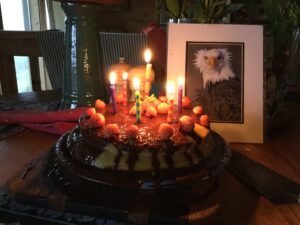My twenty-eight farm was Diamond View in Homer, Alaska.
The Farm
The farmers are Samantha and Robert. Samantha grew up in Cape Breton, Canada after her parents moved there from Vermont in the 1970s. They led a hippie-homesteader lifestyle that rubbed off on their daughter. Back in the States, Samantha became a paramedic and lived in Pittsburg and Richland, Virginia. She met her first husband, Steve, at a farmer’s market in Burlington, Vermont. They were drawn to Homer by the prospect of cheap land, the opportunity for homeschooling their two boys, and because Samantha’s sister was there. Steve had NPR radio stations in Ketchikan and then in Homer. Tragically, Steve was killed in an accident. He is buried in a special spot on the farm.
Samantha manages the paramedics in Homer and conducts their trainings. She is also a volunteer paramedic and is on-call for any emergency.
Robert is an artist. For ten years he followed the Grateful Dead and sold his artwork at the shows. He does ceramics, stained glass, and sculpture.
The two sons were 18 and 20 when I visited. The younger one, Rowyn is an avid LARPer and an amateur actor. The older one, a medic, was helping the firefighters in Montana.
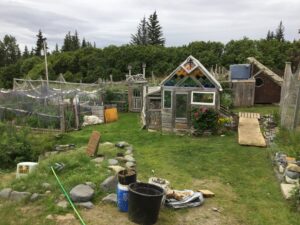 The sprawling five-acre farm is both wild and peaceful. The air is exquisitely fresh—there are no big cities anywhere near to pollute the sky. Diamond Ridge is the name of the street, and there are some diamond views along it.
The sprawling five-acre farm is both wild and peaceful. The air is exquisitely fresh—there are no big cities anywhere near to pollute the sky. Diamond Ridge is the name of the street, and there are some diamond views along it.
My Experience
A big event was coming when I arrived on the farm in August. Samantha was turning 50 and a big community party was taking shape. Being a volunteer paramedic put Samantha in the hearts of many who might not have otherwise met her. The party was still a week away and there were tasks to be done on the farm.
There was another WWOOFer while I was there. Sonia, from Cleveland, Ohio, was twenty-eight and having her first WWOOFing experience.
Samantha leads a fast-paced life. She never seems to sit down. At home she is usually found standing in the kitchen. Cooking is a passion. But, just as things are coming to a boil, she gets a message. Aid is needed. If she can be the first on scene, she will hand off the ladle and race off. She’s also juggling leading paramedic trainings and attending puppy training classes.
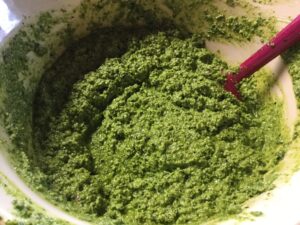 One day I found Samantha making pesto. It was a simple recipe of a mix of basil, kale, and spinach freshly harvested from the garden; olive oil; pine nuts; and parmesan cheese. It was the best pesto I’ve ever tasted. When Samantha needed to run out the door, I got put in charge of making the rest of the pesto. This made me nervous. Samantha told me the exact quantity of each ingredient doesn’t matter. What does matter is using quality olive oil and parmesan cheese. She bought a specific olive oil (I’d never seen olive oil in giant aluminum containers before.) and parmesan cheese just for the pesto. I threw handfuls and cupfuls of each ingredient into the blender, whipped it up, and gave it a taste. Sure enough, each batch tasted just as good as the last.
One day I found Samantha making pesto. It was a simple recipe of a mix of basil, kale, and spinach freshly harvested from the garden; olive oil; pine nuts; and parmesan cheese. It was the best pesto I’ve ever tasted. When Samantha needed to run out the door, I got put in charge of making the rest of the pesto. This made me nervous. Samantha told me the exact quantity of each ingredient doesn’t matter. What does matter is using quality olive oil and parmesan cheese. She bought a specific olive oil (I’d never seen olive oil in giant aluminum containers before.) and parmesan cheese just for the pesto. I threw handfuls and cupfuls of each ingredient into the blender, whipped it up, and gave it a taste. Sure enough, each batch tasted just as good as the last.
Samantha and Robert had recently gotten a German Shephard puppy. They were training Ruby using only positive reinforcement. When she showed good behavior,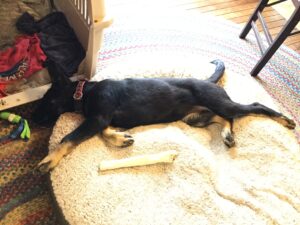 she got a treat. Bad behavior was ignored. That part was hard, especially for Robert. It’s a normal reaction to say No! when a pet does something they shouldn’t. We had to learn to bite our tongues. A clicking noise followed getting a treat. Eventually, Ruby should find the clicking noise desirable and learn commands from the reinforcement of the clicks. I doubt even if I were given all the German chocolate cake in the world, I would ever find the sound of the clicks desirable.
she got a treat. Bad behavior was ignored. That part was hard, especially for Robert. It’s a normal reaction to say No! when a pet does something they shouldn’t. We had to learn to bite our tongues. A clicking noise followed getting a treat. Eventually, Ruby should find the clicking noise desirable and learn commands from the reinforcement of the clicks. I doubt even if I were given all the German chocolate cake in the world, I would ever find the sound of the clicks desirable.
Gardens in Alaska can be very productive. The long days of summer encourage vibrant growth. August is the prime harvest season. It is also the busiest season because the harvested food has to be processed and turned into things like delicious pesto, strawberry jam with brandy, tomato sauce, and soup stock.
Sonia and I hilled the potatoes. Meaning we put more dirt around the part of the plants that were above ground. Higher hills equals more and bigger potatoes. We weeded…a lot, and picked flowers for the party.
Weeds too grow prolifically with the abundance of daylight and marine moisture too. Sadly, I had to pull out unwanted fireweed, one of my favorite flowers, because it will take over an area. Alaska has a sinister plant, locally called pushki, but more commonly called cow parsnip. This evil plant has sap that contains phototoxic chemicals which are activated by ultraviolet light. Herbivorous bugs are repelled by the chemical. If the sap gets on our skin and it’s a sunny day, we get painful, itchy burn-blisters. Sonia and I wore protective gloves and clothing when we removed the pushki from the property.
One day Sonia and I were given the onerous task of weeding around the little trees that were on the border of the property. Annoyingly tall metal cages encircled each tree. Moose will graze on the branches. If the cages aren’t tall enough, when the snow piles up, the moose will be able to reach over the top. Getting the cages open and away from the trees was a challenge. Weeding under the low branches wasn’t fun either. We gave up at putting the cages back on. Somehow Sonia went off to do something else and I got left with finishing the trees. I persevered. Robert came out to help put the cages back on. Once it was done and I stepped back from it, I was impressed at what a difference the weeding made. The trees looked great and should be happier too.
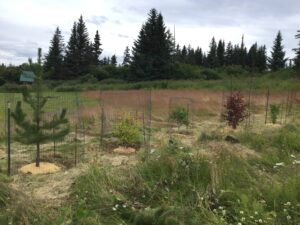
The number one meat in Alaska is elk. Alaskans are lucky. I had elk burgers on a farm in the southwest. Elk is delicious! I now salivate when I see one.
The Fat Boys needed to go on the chopping block. The chickens had gotten so big they could barely wattle around their pen. Samantha had borrowed a new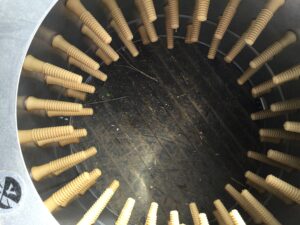 device to make the plucking go faster. The Plucker was a rather suggestive contraption of long beige fingers. It twirled in a circle, dislodging the feathers as the headless chicken rubbed against the rubber fingers.
device to make the plucking go faster. The Plucker was a rather suggestive contraption of long beige fingers. It twirled in a circle, dislodging the feathers as the headless chicken rubbed against the rubber fingers.
Once out of the Plucker, the chickens were hung up so Robert could carefully torch off the pin feathers. Next, they were taken to Samantha and Sonia to be butchered. Initially a bit turned off by the idea of chopping up chickens, after some coaching from Samantha, Sonia discovered that dismembering chickens is a lot of fun.
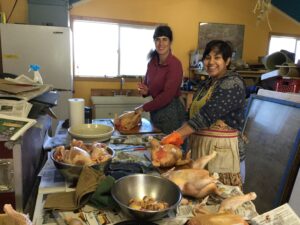
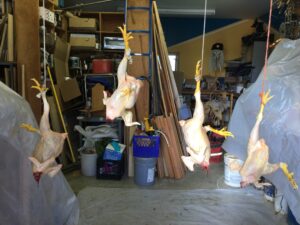
Every day a pair of grey leggy sandhill cranes flew in from wherever they spent the night and hung out on the front lawn. They made a lot of noise, especially for two birds just standing around on a lawn.

“It’s sad when the fireweed has flowers at the top. It means summer is over.” Robert.
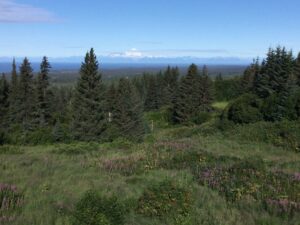 Most evenings I took a solitary walk down Diamond Ridge Road. The area is scenic. Once I got far enough down the road, I could see the glaciers and mountains across the bay. Even in August the sun didn’t go down until after ten. My walks could continue until after eleven. But the seasons change fast in the northern latitudes. The days were noticeably shorter in just a couple weeks’ time. I observed the fireweed. The pink flowers were at the tips of the long stalks. A smattering of white was on the distant hills. Alaskans call this first snow at the end of summer Termination Dust. Summer is over, it’s time for the contract workers to return home. Fall was on the horizon.
Most evenings I took a solitary walk down Diamond Ridge Road. The area is scenic. Once I got far enough down the road, I could see the glaciers and mountains across the bay. Even in August the sun didn’t go down until after ten. My walks could continue until after eleven. But the seasons change fast in the northern latitudes. The days were noticeably shorter in just a couple weeks’ time. I observed the fireweed. The pink flowers were at the tips of the long stalks. A smattering of white was on the distant hills. Alaskans call this first snow at the end of summer Termination Dust. Summer is over, it’s time for the contract workers to return home. Fall was on the horizon.
After buckets of rain the day before, the sun was blazing on the morning of August 21st, my birthday and the day of a total solar eclipse. In Homer, only 46% of the sun would be eclipsed by the moon. Still, it was something I wanted to see. Dark translucent clouds drifted across the sun. No moon in sight. At 9:13 the show was at climax. Why couldn’t I see anything? About ready to give up, I walked past the car and noticed I could see the eclipse through the blue tint at the top of the windshield. A nice little birthday present.
For my birthday Robert took me to his studio and showed me how he made blown-glass beads. He took thin sticks of glass and heated them with a flame. As the glass melted, he moved the sticks in a circle to form a ball. I got to choose the colors.
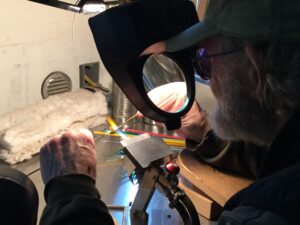
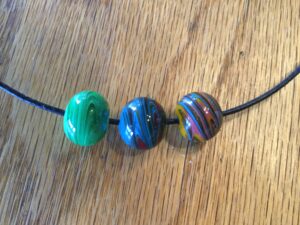
My accommodations were a tent under a tree. Towards the end of my stay Robert mentioned he saw moose tracks by it. Moose are huge and frequently angry. I didn’t want to encounter one staggering out of my tent in the morning.
“Do you smell smoke?” Sonia.
Robert had some salmon to smoke. He brought out the smoker and put in the racks of salmon. We were off doing other things when Sonia asked, “Do you smell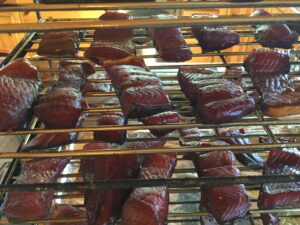 smoke?” “It’s the smoked salmon,” Robert replied. A pause. “It doesn’t smell like salmon,” Sonia observed. We turned and saw plumes of white smoke coming from the smoker. The oil from the salmon had caught on fire. Robert raced over and put the fire out. Salmon’s done! Samantha came out and collected it.
smoke?” “It’s the smoked salmon,” Robert replied. A pause. “It doesn’t smell like salmon,” Sonia observed. We turned and saw plumes of white smoke coming from the smoker. The oil from the salmon had caught on fire. Robert raced over and put the fire out. Salmon’s done! Samantha came out and collected it.
On a day off, Sonia and I took the water taxi across the bay to Kachemak Bay State Park. I wanted to see ice bergs. We meandered down the flat gravely Glacier Lake Trail to Grewingk Lake which sat at the toe of Grewink Glacier. Bobbing in the lake were chucks of the glacier. My first ice bergs! Walking along the shore, I could get close to a few. Looking closely, I found some bergs had dark blue areas that shown like jewels.
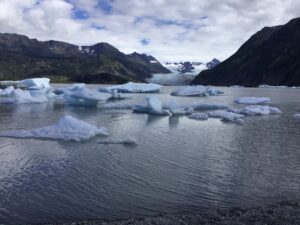
Saving people’s lives can lead to a large and grateful gathering when a big birthday rolls around. Samantha turned 50 and celebrated by spending two days in the kitchen cooking for her party. She mentioned wanting a grill and soon a very nice grill with a red ribbon appeared next to the house. The party couldn’t have been better. Friendly, interesting people and great food. Ning, a woman from Taiwan, had my favorite quote of the night: ‘People leave where they don’t want to be to travel to where other people don’t want to be.’ However, these people who had traveled at some point in their lives to Homer, discovered they had found the place where they wanted to be.
